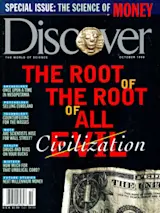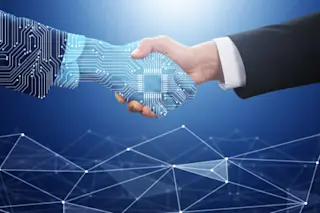TEARS AND FEARSPhilip Davis, professor emeritus of applied mathematics, Brown University There are so many new commercial electronic, computer-driven products available these days that their technological aspects bore me to tears. Despite the fact that some of them--voice identification, for example--have a considerable, often deep mathematical underlay, what interests me now is what these products will do to and for society.
Money is one of the first and most pervasive of all the mathematizations that civilized society has adopted. If one excepts--these days--the vast amount of computation that occurs in data transmission and signal processing, then probably the bulk of all computations done relates to money. The progression toward more and more abstract, virtual, or meta-moneys, toward the transfer, conversion, unification, and diversification of money will go on ceaselessly.
What is underdiscussed, particularly among technologists, is what the pluses and minuses of this trend will be for human behavior and ...














